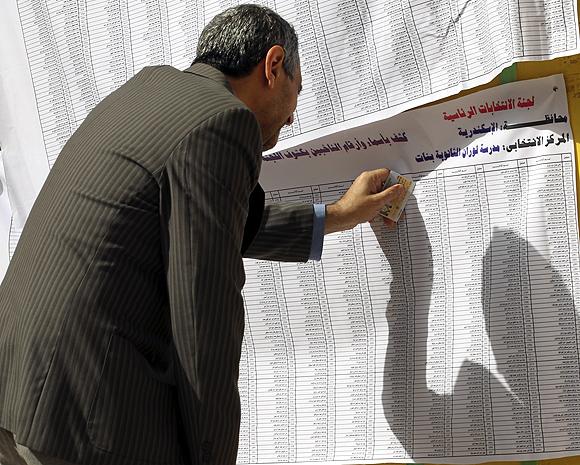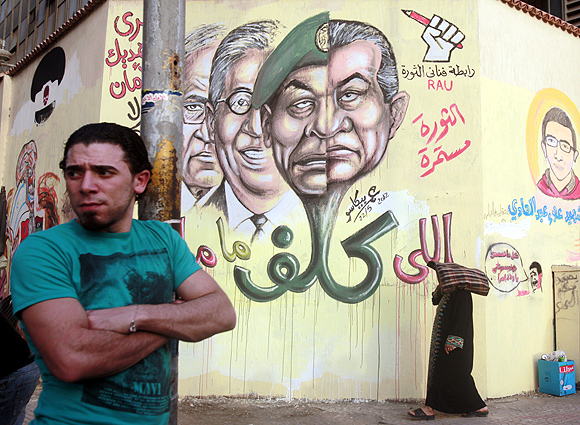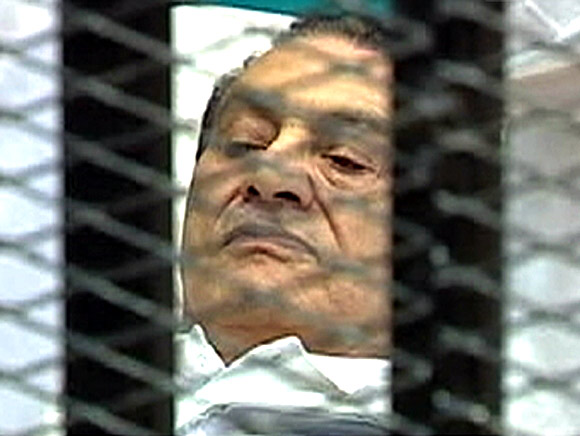
After ruling the country with an iron hand for over three decades, Hosni Mubarak was forced to quit on February 11, 2011, and handed over power to the army capitulating under mass protests sweeping the country's streets.
Tahrir Square, the epicenter of the anti-government protests, erupted in joy with tens of thousands of people shouting 'Egypt is Free".
Five months after the popular uprising ousted Mubarak from absolute power, the deposed president Hosni Mubarak was flown into Cairo to face trial for murder and corruption.
The former president was charged with conspiring to kill protesters and corruption.
However, today, Egypt, which came under dictatorship 60 years ago, on Wednesday, will vote to choose their president in the first-ever competitive elections to be held.
...

The two-day exercise kicked off on Wednesday morning amid tight security and is the final phase of a tumultuous transition overseen by the increasingly unpopular ruling military council.
The historic presidential election is being contested by candidates with both Islamist and secularist leanings who have promised radically different futures for the country.
A total of 13 contenders are in the fray but the race boils down to five major names.
Two figures of the former regime --former foreign minister Amr Moussa and former prime minister Ahmad Shafiq, are up against two Islamists -- Mohamad Morsi from the Muslim Brotherhood and Muslim Brotherhood-defect Abd-al-Munim Abul Futtuh, and leftist front-runner Hamadin Sabahi.
If no candidate gets an absolute majority, the top two vote-getters would compete in a run-off on June 16 and 17. The winner of the run-off would become Egypt's first post-Mubarak era president and will take office before July 1.
The elections are being conducted under full judicial supervision and international monitors have arrived to observe the transparency of the process.
People have been queuing up in front of polling stations since 6 am, two hours before the poll was expected to open.
...

The Cabinet met on Wednesday to discuss the monitoring of the presidential election.
Meanwhile, Justice Minister Adel Abdel Hamid has also formed an operations room for the purpose.
"People can call 19303 about any problem," he said. Ganzouri asked citizens to participate in the election as "their duty" and urged them to accept the decision of the majority.
"I hope the election would pass peacefully. And I call on all political forces to accept the result," he said.
Political, revolutionary forces and trade unions have also formed monitoring centres while the Judges for Egypt Movement has deployed 350 judges and 1,500 observers to monitor the process.
Also, 9,457 observers from 53 various human rights groups accredited by the Presidential Elections Commission would be present at the polling stations.
The Carter Centre has allowed 22 international observers from 14 countries to observe the campaigning, the voting and the counting.
In a surprise move, the Secretary General of the Presidential Elections Commission, Hatem Bagato has said that ousted President Hosni Mubarak and his son, Gamal, have the right to vote in the presidential election.
Bagato, speaking to local Al-Masry Al-Youm, said that the commission has not yet received a request from them to take part in the election.
He confirmed that the commission is still studying requests from detainees to vote.
The sources added that former President Mubarak, who is detained in a medical centre, and 44 former regime officials, held in five different prisons, have all not applied to vote.
Egyptian law allows detainees to vote as long as they have not been convicted.
Mubarak became the first Arab ruler in modern times to be put in the dock. His trial had rattled Arab rulers -- monarchs and presidents -- who have had long held sway over most of the Muslim nations in the region.
...

On Tuesday, the Supreme Council of the Armed Forces, which has been in power since Hosni Mubarak's ouster, appealed to Egyptians to turn out en masse to the polls and warned against any violation.
Over 52 million Egyptians voters are eligible to choose their next president on Wednesday and Thursday.
Egyptians, meanwhile, are holding their breath lest any surprises pop up during the elections.
"I am a sick man but came early to vote because I don't want my country to be stolen anymore. I don't want the revolution to be stolen anymore. I trust in these elections because I believe in the people of my country," a voter standing outside the polling station said.
"I trust these elections will be transparent because every citizen is keen on casting his vote. If someone does not vote then he has done his country wrong. People will accept the results," another voter said.
Others said this historic exercise marks an end to autocratic rule once and for all.
"The election is a result of the revolution. There is no way one person will monopolise the power again. Tahrir has become a symbol. The entire country is now Tahrir," a voter added.
The polling stations will open for 12 hours on Wednesday and another 12 hours on Thursday and the results are expected on May 29.
Prime Minister Kamal al-Ganzouri has declared a day off for the government employees during the election.
...

Political corruption was said to be rampant during Mubarak administration. Corruption led to the imprisonment of political figures and young activists without trials, illegal detention facilities, etc.
After increased domestic and international pressure for democratic reform in Egypt, Mubarak asked the parliament on 26 February 2005 to amend the constitution to allow multi-candidate presidential elections by September 2005.
Mubarak, however, secured his position by having himself nominated by parliament, then confirmed without opposition in a referendum.
According to the BBC, Mubarak has survived six assassination attempts.
President Mubarak has been re-elected by majority votes in a referendum for successive terms on four occasions: in 1987, 1993, and 1999. However, the referendum in itself and its results has been of questionable validity.
Experts believe the personal wealth of Mubarak and his family to be between US$40 billion and $70 billion.
On 12 February 2011, the government of Switzerland announced that it was freezing the Swiss bank accounts of Mubarak and his family.
...